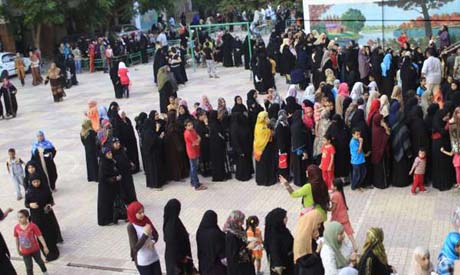
Voters wait in line before casting their votes during Egypt's presidential election, at a polling station in Giza. (Photo: Reuters)
The second day of Egypt's two-day presidential runoff saw campaigners for both Muslim Brotherhood candidate Mohamed Morsi and Mubarak-era premier Ahmed Shafiq urging the Egyptian public to exercise their right to vote. Low voter turnout, however, marked a retreat from the celebratory mood that had pervaded parliamentary polls late last year and last month's first-round presidential vote.
While many blamed the low voter numbers on the stiflingly hot weather, some believed it was politically motivated.
"In the first-round vote, candidates such as Abdel-Moneim Abul-Fotouh, Hamdeen Sabbahi and others together obtained a larger number of votes than Shafiq and Morsi," the supervising judge at a polling station in Cairo's Abdeen district told Ahram Online. "It's unlikely that the same people will vote for either of the two finalists."
Although most polling stations appeared empty on Saturday, Farouq Sultan, head of Egypt's Supreme Presidential Electoral Commission (SPEC), announced that voter turnout had hit 40 per cent by midday and was expected to increase by the end of the day. Indeed, turnout increased noticeably in the final hours, when voters could be seen lining up outside polling stations shortly after sunset.
Meanwhile, the two presidential campaigns continued to exchange accusations of electoral fraud. There were several reports of violations, meanwhile, including illegal campaigning in front of polling stations, vote-buying, influencing voters to choose certain candidates, and arranging votes for military and police personnel.
Rights organisations also confirmed violations, reporting that both campaigns had influenced voters and pre-marked ballots. Scattered incidents of vote-buying were also reported.
At a press conference, Sultan confirmed that both candidates' campaigns had committed violations during the first day of voting.
"We observed more breaches by one candidate than the other," Sultan said, declining to name which candidate he meant.
Meanwhile, a handful of activists from the April 6 Youth Movement were arrested while campaigning against Shafiq. They urged members of the public to refrain from voting for Mubarak's last prime minister while carrying placards bearing the images of protesters slain in last year's Tahrir Square uprising.
Dozens of activists also gathered in Cairo's Tahrir Square to express their contempt for the electoral process as a whole. The Tahrir Square demonstration was initially organised by election boycotters, who rejected the notion of polls held under military rule.
Shafiq supporters, for their part, appeared more conspicuous than their pro-Morsi counterparts, one Ahram Online reporter observed.
"Shafiq will win, God willing," one woman in her fifties shouted at soldiers deployed outside a Giza polling station.
Many of those asked at polling stations, meanwhile, said they planned to cast ballots for Morsi. According to several Ahram Online correspondents, most of the voters seen towards the end of the day were Morsi supporters.
Official voting results are slated to be announced on 21 June, after the SPEC has a chance to examine appeals. Preliminary results, however, are expected by late Saturday night or Sunday morning.
Short link: